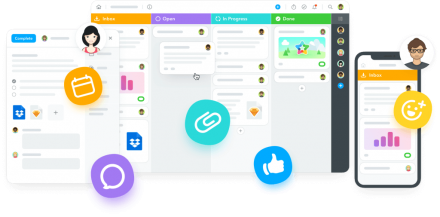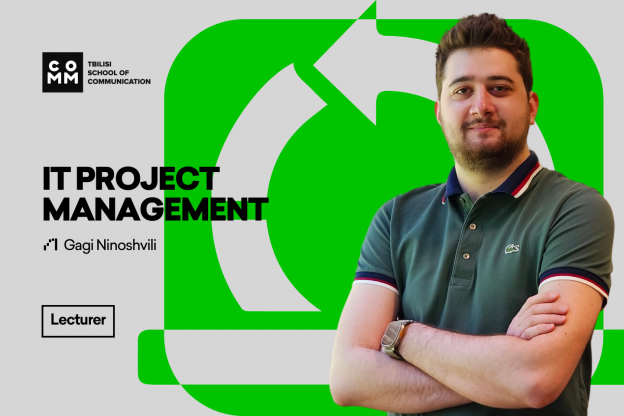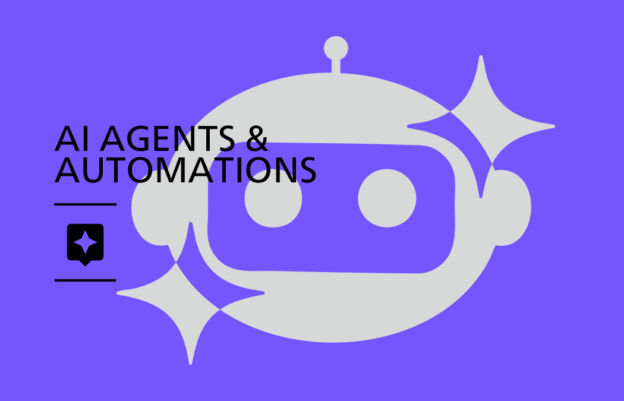Before starting the free course, please read the following terms and conditions
to begin
your journey:
წესები & პირობები
ყოველგნარი გაუგებრობის თავიდან აცილების მიზნით, გთხოვთ, ყურადღებით გაეცნოთ ამ წესებს და პირობებს კურსის შეძენამდე.
1. რეგისტრაცია
-
1.1.
კურსზე რეგისტრაციით, თქვენ ეთანხმებით ამ წესებსა და პირობებს ("პირობები").იმ შემთხვევაში თუ თქვენ შერჩეული იქნებით კურსისთვის მოგიწევთ ამ წესებით და პირობებით ხელმძღვანელობა.
-
1.2.
თბილისის კომუნიკაციის სკოლა იტოვებს უფლებას არ შეარჩიოს აპლიკანტი კურსზე, თუ ის არ აკმოყიფილებს კურსის პრერეკვიზიტებს.
2. განმარტებები
-
2.1.
"სერვისი" გულისხმობს ჩვენს ვებ-გვერდს ვებსაიტს, სასწავლო პროგრამებს/კურსებს და დაკავშირებულ მასალებს ან/და კომუნიკაციას.
-
2.2.
"მომხმარებელი," "თქვენ," ან "თქვენი" გულისხმობს ნებისმიერ პირს ან ორგანიზაციას, რომელიც სარგებლობს ჩვენი სერვისებით, მათ შორის, კურსებით დაინტერესებული პირი, აპლიკანტი, სტუდენტი.
-
2.3.
"კონტენტი" გულისხმობს ყველა მასალას, კურსს, დოკუმენტს და ინფორმაციას, რომელიც ხელმისაწვდომია ჩვენი სერვისის მეშვეობით.
-
2.4.
„ლექტორი“ ადამიანი, რომლიც ხელმძღვანლობს კონკრეტულ სასწავლო პროგრამას/კურსს, ხოლო კურსის მონაწილეებს - მენტორობას.
-
2.5.
„კოორდინატორი“ - ადამიანი, რომელიც კოოდინირებას უწევს სასწავლო პროცესებს, იქნება ეს სასწავლო პროცესის დაგეგმვა ცხრილის გაწერიდან კურსის დასასრულამდე თუ “სტუდენტის” დახმარება სასწავლო პროცესის მიმდინარეობისას.
3. კურსზე რეგისტრაცია
-
3.1.
კურსზე რეგისტრაციის მომენტში სტუდენტი იღებს სრულ პასუხისმგებლობას, რომ მას:
-
3.1.1.
წაკითხული და გააზრებული აქვს კურსის პრერეკვიზიტები და მოთხოვნები;
-
3.1.2.
გააზრებული აქვს კურსის შინაარსი, სილაბუსი;
-
3.1.3.
გაეცნო კურსის ლექტორს და მის ბიოგრაფიას;
-
3.1.4.
გააზრებული აქვს კურსის დატვირთვა და ინტენსივობა;
-
3.1.5.
გააზრებული აქვს კურსის ფორმატი;
-
3.2.
კურსზე რეგისტრაციის მომენეტში სტუდენტი ტვირთავს განახლებულ რეზიუმეს, რომლის სისწორეზეც სრული პასუხისმგებლობა ეკისრება მას.
-
3.3.
სტუდენტმა კურსის დაწყებამდე მინიმუმ 5 დღით ადრე უნდა შეატყობინოს კოორდინატორს რეგისტრაციის გაუქმების და კურსიდან ამორიცხვის მოთხოვნა.
4. დასწრება და მონაწილეობა
-
4.1.
სტუდენტები ვალდებულნი არიან:
-
4.1.1.
შეასრულონ ფინალურური პროექტი და მიიღონ 51 ქულაზე მეტი, იმისათვის რომ კურსი ჩაითვალოს წარმატებულად დასრულებულად და სტუდენტს გადაეცეს სერტიფიკატი;
-
4.1.2.
დაიცვან ლექტორისა და კურსის კოორდინატორის მითითებები;
-
4.1.3.
არ შეუშალონ ხელი სალექციო პროცესის მიმდინარეობას;
-
4.1.4.
აცნობონ კოორდინატორს ყველანაირი გადაუდებელი პრობლემა (ჯანმრთელობის პრობლემა, ოჯახის წევრების გარდაცვალება, ა.შ.), რომელიც ხელს უშლის მათ დასწრებას ან/და ფინალური პროექტის ჩაბარებას.
5. ანგარიშსწორება
-
5.1.
კურსის საფასური სრულად უნდა იყოს გადახდილი კურსის დაწყებამდე 7 დღით ადრე.
-
5.2.
თანხის სრულად დაბრუნება შესაძლებელია მხოლოდ კურსის დაწყებამდე 5 დღით ადრე, იმ შემთხვევის გარდა როდესაც კურსი ჩვენი მიზეზის გამო არ იწყება.
6. ინტელექტუალური საკუთრების უფლებები
-
6.1.
ჩვენი სერვისის მეშვეობით მოწოდებული ყველა მასალა დაცულია საავტორო და სხვა ინტელექტუალური საკუთრების უფლებებით.
-
6.2.
მომხმარებლებს არ აქვთ უფლება:
-
6.2.1.
გადაიღონ ან ჩაიწერონ ვიდეო ლექციები ადმინისტრაციისგან დამოუკიდებლად;
-
6.2.2.
გაუზიარონ მესამე პირს წვდომისთვის საჭირო მონაცემები და ჩანაწერები;
-
6.2.3.
გაავრცელონ ან გაყიდონ სასწავლო მასალები;
-
6.3.
კურსის განმავლობაში შექმნილი დემო/ფინალური პროექტების ინტელექტუალური საკუთრება ეკუთვნის სტუდენტს.
-
6.4.
თბილისის კომუნიკაციის სკოლას აქვს უფლება გამოიყენოს პროექტები მარკეტინგული და სარეკლამო მიზნებისთვის.
-
6.5.
სტუდენტს უფლება აქვს გამოიყენოს პროექტები საკუთარ პორტფოლიოში.
-
6.6.
დემო/ფინალური პროექტების გამოყენების შეზღუდვები:
-
6.6.1.
აკრძალულია სხვა სტუდენტების პროექტების კოპირება ან გამოყენება;
-
6.6.2.
დაცული უნდა იყოს მესამე მხარის საავტორო უფლებები.
7. პასუხისმგებლობის შეზღუდვა
-
7.1.
თბილისის კომუნიკაციის სკოლა არ არის პასუხისმგებელი:
-
7.1.1
მომხმარებლის ტექნიკურ პრობლემაზე ან მათი მიზეზით სერვისის შეფერხებებზე;
-
7.1.2.
სტუდენტის პროგრამული სისტემებით უზრუნველყოფზე კურსების მიმდინარეობისას;
-
7.1.3.
მომხმარებლისთვის თანხის დაბრუნებაზე, იმ შემთხვევაში, თუ თბილისის კომუნიკაციის სკოლისგან დამოუკიდებლად, ან წინამდებარე წესებისა და პირობებით გათვალისწინებული მოთხოვნების დაღვევის გამო, პირი არ/ვერ ისარგებლებს შეთავაზებული მომსახურებით.
8. გაუქმების პოლიტიკა
-
8.1.
თბილისის კომუნიკაციის სკოლა იტოვებს უფლებას:
-
8.1.1
გააუქმოს ან გადაიტანოს კურსები;
-
8.1.2.
შეცვალოს კურსის შინაარსი;
-
8.1.3.
შეცვალოს ლექტორი;
-
8.1.4.
შეცვალოს ლექციების განრიგი.
-
8.2.
პუნქტით გათვალისწინებულ შემთხვევებში, თბილისის კომუნიკაციის სკოლა იღებს ვალდებულებას მომხარებელს შეატყობინოს ცვლილების შესახებ გონივრულ ვადაში, მანამ სანამ კურსი დაიწყება.
9. სერტიფიცირება
-
9.1.
სერტიფიკატები გაიცემა მხოლოდ:
-
9.1.1
კურსის წარმატებით დასრულების შემდეგ;
-
9.1.2.
ყველა გადასახადის დაფარვის შემდეგ.
-
9.2.
ფინალური პროექტის გადაბარება არ არის დაშვებული სკოლის მიერ.
-
9.3.
ფინალური პროექტის გადადება ან ვადაზე ადრე ჩაბარება არ ხდება, იმ შემთხვევის გარდა თუ:
-
9.3.1
სტუდენტს აქვს ჯანმრთელობის პრობლემა და შეუძლია წარმოადგინოს ცნობა;
-
9.3.2
სტუდენტს აქვს გადაუდებელი პირადი მიზეზები, რომლის დადასტურებაც შესაძლებელია დოკუმენტით.
10. ცვლილებები
-
10.1.
თბილისის კომუნიკაციის სკოლა იტოვებს უფლებას შევცვალოთ ეს პირობები ნებისმიერ დროს. ცვლილებები ძალაში შედის ვებგვერდზე გამოქვეყნებისთანავე.
-
10.2.
თბილისის კომუნიკაციის სკოლის საკუთრებაა:
-
10.2.1.
ყველა სასწავლო მასალა, პრეზენტაცია, ვიდეო და აუდიო ჩანაწერი;
-
10.2.2
მეთოდოლოგიური მასალები და სასწავლო გეგმები.
11. კონფიდენციალურობის პოლიტიკა
-
11.1.
ჩვენი სერვისით სარგებლობა ასევე რეგულირდება ჩვენი კონფიდენციალურობის პოლიტიკით, რომელიც ამ პირობების განუყოფელი ნაწილია.
12. დამატებითი პირობები
-
12.1.
უფლებების დაცვის მექანიზმები:
-
12.1.1.
თბილისის კომუნიკაციის სკოლა იტოვებს უფლებას გაატაროს სამართლებრივი ზომები უფლებების დარღვევის შემთხვევაში.
-
12.1.2.
დარღვევებზე რეაგირება მოხდება საქართველოს კანონმდებლობის შესაბამისად.
-
12.1.3
მომხმარებელი თანახმაა აანაზღაუროს იურიდიული ხარჯები დარღვევის შემთხვევაში.
13. პირობების მიღება
-
13.1.
კურსზე რეგისტრაციით თქვენ ადასტურებთ, რომ წაიკითხეთ, გაიგეთ და ეთანხმებით ამ წესებსა და პირობებს.
14. მოქმედი კანონმდებლობა
-
14.1.
ეს წესები და პირობები ექვემდებარება საქართველოს კანონმდებლობას.
Terms & Conditions
To avoid any misunderstandings, please carefully review these terms and conditions before purchasing the course
1. Registration
-
1.1.
By registering for the course, you agree to these terms and conditions ("Terms"). If you are selected for the course, you will be required to abide by these terms and conditions.
-
1.2.
The Tbilisi School of Communication reserves the right not to select an applicant for the course if they do not meet the course prerequisites.
2. Definitions
-
2.1.
"Service" refers to our website, educational programs/courses, and related materials or communications.
-
2.2.
"User," "you," or "your" refers to any person or organisation using our services, including interested parties, applicants, and students.
-
2.3.
"Content" refers to all materials, courses, documents, and information available through our service.
-
2.4.
"Lecturer" is a person who leads a specific educational program/course and mentors course participants.
-
2.5.
"Coordinator" is a person who coordinates educational processes, from scheduling to course completion, and assists "students" during the learning process.
3. Course Registration
-
3.1.
At the time of course registration, the student takes full responsibility that they:
-
3.1.1.
Have read and understood the course prerequisites and requirements;
-
3.1.2.
Understand the course content and syllabus;
-
3.1.3.
Have reviewed the course lecturer and their biography;
-
3.1.4.
Understand the course workload and intensity;
-
3.1.5.
Understand the course format;
-
3.2.
At the time of course registration, the student is required to upload an updated resume, for which they are fully responsible for ensuring its accuracy.
-
3.3.
The student must inform the coordinator at least 5 days in advance if they cannot start the course.
4. Attendance and Participation
-
4.1.
Students are obliged to:
-
4.1.1.
Complete the final project and receive more than 51 points for the course to be considered completed and for the student to receive a certificate;
-
4.1.2.
Follow the instructions of the lecturer and course coordinator;
-
4.1.3.
Not interfere with the lecture process;
-
4.1.4.
Must inform the coordinator of any urgent issues (such as health problems, the death of a family member, etc.) that prevent them from attending or submitting the final project.
5. Payment
-
5.1.
The course fee must be paid in full 7 days before the course starts.
-
5.2.
A full refund is possible only 5 days before the course starts, except when the course does not start due to our reasons.
6. Intellectual Property Rights
-
6.1.
All materials provided through our service are protected by copyright and other intellectual property rights.
-
6.2.
Students are not allowed to:
-
6.2.1.
Copy or record video lectures independently of the administration;
-
6.2.2.
Share access data and records with third parties;
-
6.2.3.
Distribute or sell educational materials.
-
6.3.
The intellectual property of demo/Final projects created during the course belongs to the student.
-
6.4.
The Tbilisi School of Communication has the right to use projects for marketing and advertising purposes.
-
6.5.
The student has the right to use projects in their portfolio.
-
6.6.
Restrictions on the use of demo/Final projects:
-
6.6.1.
It is forbidden to copy or use other students' projects;
-
6.6.2.
Third-party copyrights must be respected.
7. Limitation of Liability
-
7.1.
The Tbilisi School of Communication is not responsible for:
-
7.1.1
User's technical problems or service disruptions caused by them;
-
7.1.2.
Providing software systems for students during courses;
-
7.1.3.
Refunding the user if, independently of the Tbilisi School of Communication or due to violation of these terms and conditions, the person does not/cannot use the offered service.
8. Cancellation Policy
-
8.1.
The Tbilisi School of Communication reserves the right to:
-
8.1.1
Cancel or postpone courses;
-
8.1.2.
Change course content;
-
8.1.3.
Change the lecturer;
-
8.1.4.
Change the lecture schedule;
-
8.2.
In cases provided for in this clause, the Tbilisi School of Communication undertakes to notify the user of the change within a reasonable time before class starts.
9. Certification
-
9.1.
Certificates are issued only:
-
9.1.1
After successful completion of the course;
-
9.1.2.
After all payments have been made.
-
9.2.
Retaking the final project is not allowed by the school.
-
9.3.
Postponing or submitting the final project early is not allowed, except if:
-
9.3.1
The student has a health problem and can provide a certificate;
-
9.3.2
The student has urgent personal reasons that a document can confirm.
10. Changes
-
10.1.
The Tbilisi School of Communication reserves the right to change these terms anytime. Changes take effect immediately upon publication on the website.
-
10.2.
The Tbilisi School of Communication owns:
-
10.2.1.
All educational materials, presentations, video and audio recordings;
-
10.2.2
Methodological materials and curricula.
11. Privacy Policy
-
11.1.
Use of our service is also governed by our Privacy Policy, which is an integral part of these Terms.
12. Additional Terms
-
12.1.
Rights protection mechanisms:
-
12.1.1.
The Tbilisi School of Communication reserves the right to take legal measures in case of rights violations.
-
12.1.2.
Violations will be responded to by Georgian legislation.
-
12.1.3
The user agrees to reimburse legal expenses in case of violation.
13. Acceptance of Terms
-
13.1.
By registering for the course, you confirm that you have read, understood, and agree to these terms and conditions.
14. Governing Law and Jurisdiction
-
14.1.
These terms of use, their subject matter and their formation are governed by Georgian law.

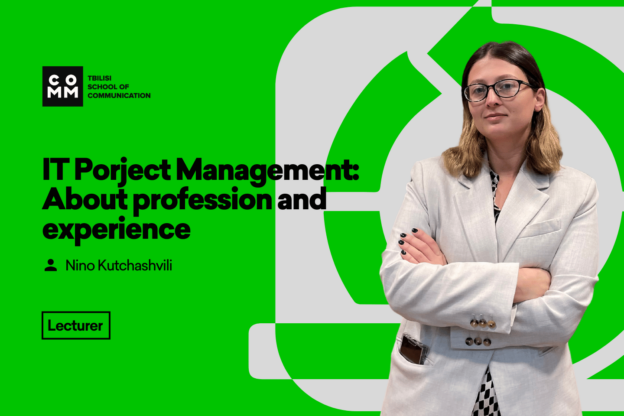






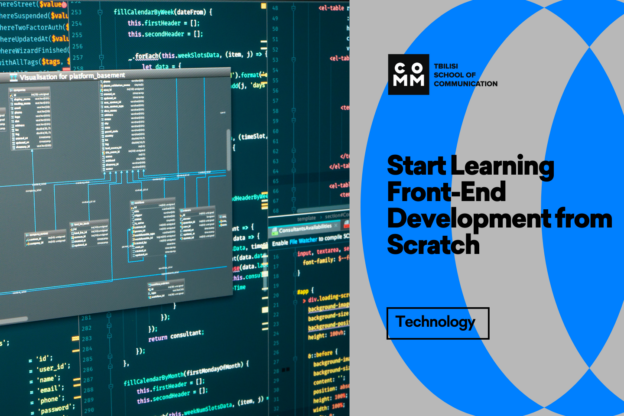


 Intermediate
Intermediate
 Beginner
Beginner
 Intermediate
Intermediate

